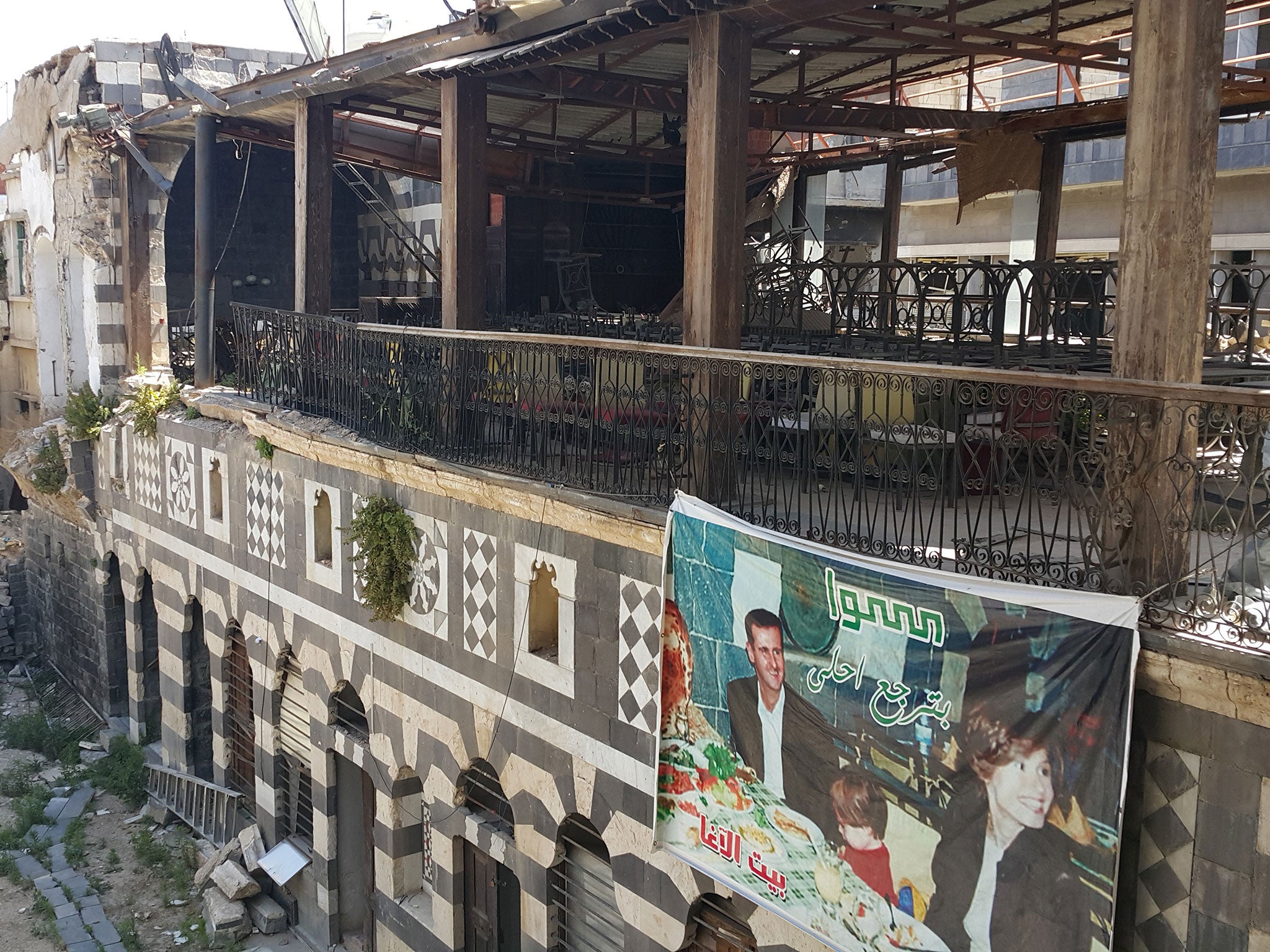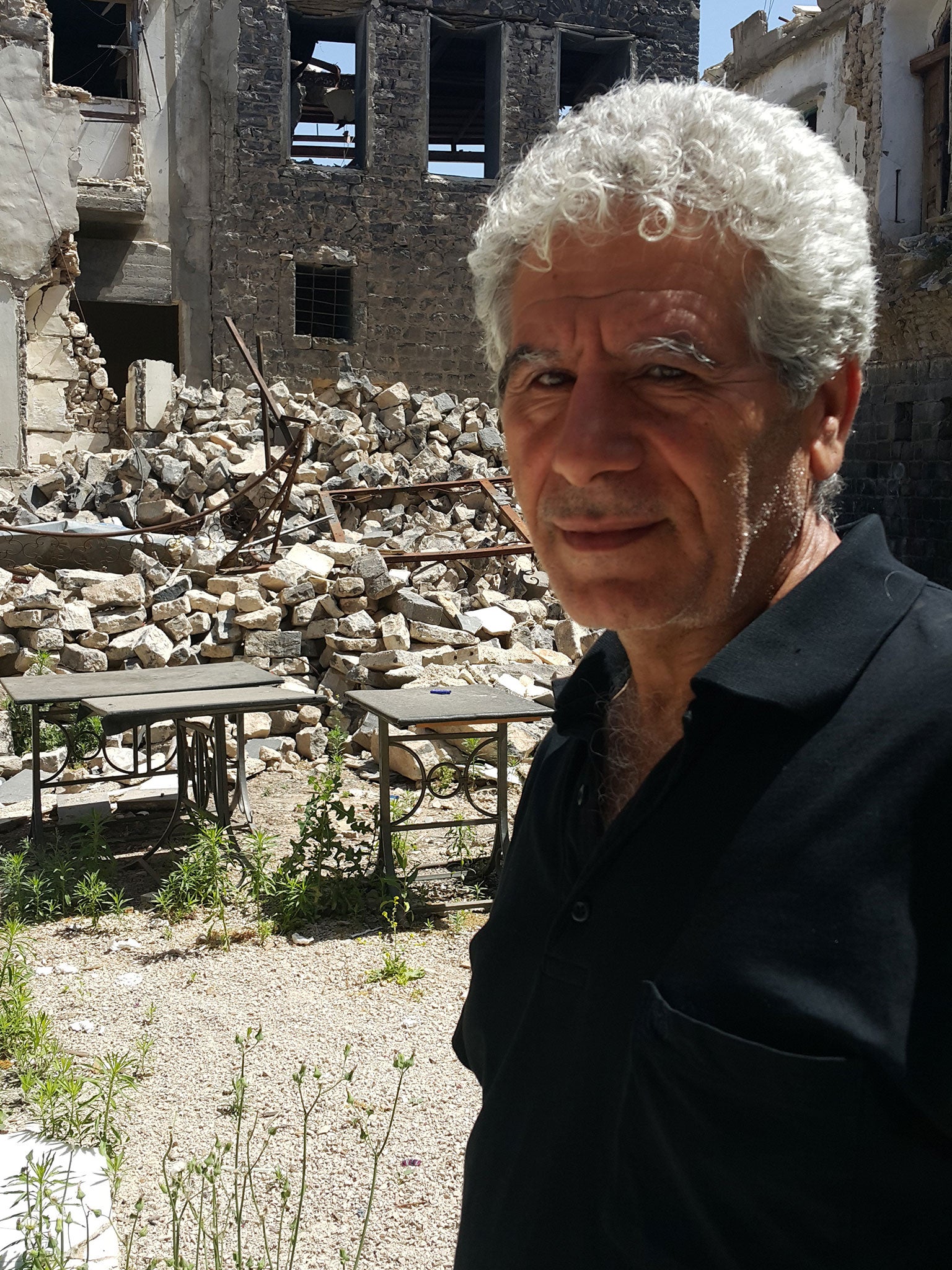Syrian civil war: Ancient Islamic teachings treasured by rebels fighting Assad – discovered in a bombed-out cafe in the ghost city of Homs
One glance through the broken windows of this famous old cafe illustrates the Dresden-like ruins – all that remains of Homs

Your support helps us to tell the story
From reproductive rights to climate change to Big Tech, The Independent is on the ground when the story is developing. Whether it's investigating the financials of Elon Musk's pro-Trump PAC or producing our latest documentary, 'The A Word', which shines a light on the American women fighting for reproductive rights, we know how important it is to parse out the facts from the messaging.
At such a critical moment in US history, we need reporters on the ground. Your donation allows us to keep sending journalists to speak to both sides of the story.
The Independent is trusted by Americans across the entire political spectrum. And unlike many other quality news outlets, we choose not to lock Americans out of our reporting and analysis with paywalls. We believe quality journalism should be available to everyone, paid for by those who can afford it.
Your support makes all the difference.From the moment you push open the battered brass doors of the wrecked Beit al-Agha Restaurant in the ruined old city of Homs and meet Elias Saman, you might sniff a familiar story.
The famous old café, with its pale blue Mamluk-design tiles, its smashed roof and the pile of great stone blocks which are all that is left of one of the dining room walls, speaks of death. The promise of its rich businessman and co-owner Rani Khoury, from the city of Tartous, to restore the place to its pre-siege, pre-revolutionary glory is the “phoenix from the ashes” part.
At first, all seems well. Elias Saman – the keeper of the tiled 1865 building of Ottoman stone and the guardian of its memories – takes his rare visitors across the unswept marble floors, up the stone staircase – be careful, of course, of the crack on the 14th step, for too much pressure may have you tumbling back to earth, and avoid the red tiles hanging from the second-floor roof, some of which have already crashed to the floor.
A glance through the broken windows illustrates the Dresden-like ruins, all that remains of Homs, the Islamist rebel stronghold which surrendered to Bashar al-Assad’s regime last year. Many of the streets are roofless facades, the houses undermined by the tunnels which the rebel Farouq Battalion dug amid their ever-shrinking ghetto.

Under the President’s orders, the great Khalid al-Walid mosque is being restored, the finest Christian church repaired, but this remains a ghost city, a few of its residents playing trick-track in broken doorways, birds flitting happily amid the shadows.
Elias will even take you down to the restaurant’s wine-store and the wooden cigar racks emptied by the “Islamists”. “They smoked the cigars and drank the wine,” he remarks. Behind the armchairs there are piles of shell cases and 106mm mortars and bits of rocket-propelled grenades on the window ledges. “This was their command headquarters and their officer sat safe behind these great walls,” Elias says. “They melted down their explosives for bombs here.” A strange mixture of war and peace, then, in the little cellar.
Craftsmen from Aleppo built the wooden part of the restaurant roof, each archway constructed to take the weight of long walls, the whole place built of the great tough black stones of Homs whose inhabitants – and its rebels – knew could defend them from storms, cannon balls or shells.
On one wall there hangs now a massive coloured poster of three famous visitors who came to dine at the Al-Agha Restaurant in the peaceful years after 2000, seated behind a table of falafel and vegetables. On the left is a beaming young Bashar, on the right his wife Asma – hair cut fashionably short for the time – and between them one of the small Assad sons.
The keeper of this venerable edifice adds quietly that last year, some former clients gathered in this same great but now shattered room to watch the football World Cup. With no local providers, they sucked the images off the satellite from Israeli television, the football fans of Homs listening with total incomprehension to the commentator’s Hebrew.
But then comes the little shock that knocks all familiar stories off the tracks.
“Come and see the library,” says Elias and he leads us to a small room – 300 years old, he says – with chairs and a cupboard from which he begins to pull heavy books with dark red and blue covers. They were never part of the restaurant. The Islamist rebels brought them here – from where, nobody knows. Many turn out to be lectures on Islamic law with thousands of neatly written remarks in the margin. Some were printed in Egypt in 1966, others in the 19th century and much earlier.
There are rules on taking out mortgages and admonitions about alcohol. “Do not crush juice into wine,” one states simply. There are Hanafi tracts, there are explanations of the Prophet’s teaching by the scholar al-Kastalani and sometimes, amid the pages, the hand-written notes of a student, perhaps a rebel who lived here before the surrender. “I started reading Volume Six on the morning of Thursday 15 August… we ask God to help us finish it with good grace.” An unknown hand – way back in 1995, 16 years before the war began – says the reader “hopes to obtain the virtue of the Imam who wrote this book”.
But other volumes contain less innocent material. There are bound copies of the old Egyptian Muslim newspaper Al-Fetah which after a long and turgid article about marriage contracts launches into a condemnation of one of the great figures of the Druze faith, one of the Middle East’s minorities which exist in both Syria and Lebanon. “The rotten atheist patriotism of the Orientalist writer Shahib Aslan,” announces one headline. “Muslims are really against those who have insulted the greatest Prophet.”
Suddenly a dark breeze seems to pass through this little library. For these are fiercely contemporary words. It is the same sectarianism which is breaking apart the Middle East today. Another essay – in a newspaper published “by the Print House of the Salafists in Istin’af Street in Cairo” – is written by Mohamed Ahmed Abdul Salem, apparently a member of the Muslim Brotherhood, in the 1940s. It records how an Egyptian Coptic Christian supposedly insulted the Prophet. Here, to chill the hearts of those who happily believe such words are a new phenomenon, is the first paragraph. “There is no doubt that their [Christian] faith is not of a high class and their prayers are not acceptable. No doubt they have never tasted the sweetness of Islam.”
I don’t know why I shuddered at these words. Mr Salem must be long dead, his newspaper forgotten, but his article has been preserved in a heavy red-leather volume with a large crimson flap to protect the pages. For students of history, this evidence of sectarianism is essential. But who were the “students” who read this during the “Islamist” battles in Homs, who brought these books here to read and protect them? The fires of religion were lit centuries ago but suddenly now, preserved amid the ashes, was this little library of jurisprudence and prejudice, much of it learned and innocent – no doubt about it – but some of it passing on to a new generation the sectarianism of grandfathers. Which is what, I suspect, civil wars in the Middle East are all about.